BOOKS

Weltbilder und Weltordnung. Einführung in die Theorie der Internationalen Beziehungen, 6th ed., Baden-Baden: Nomos, 2026, with Gert Krell, Peter Schlotter and Alexandra Homolar.

The Politics of Military Force: Antimilitarism, Ideational Change and Post-Cold War German Security Discourse, Ann Arbor: University of Michigan Press (Configurations: Critical Studies of World Politics), 2020, doi: 10.3998/mpub.10154836 .
- “Books of the Year”, Internationale Politik, 2022
- “Books of the Year”, Süddeutsche Zeitung, 2022
- Reviewed in: Atlantic Community, German Politics, H-Net, International Studies Review, Perspectives on Politics
EDITED VOLUMES
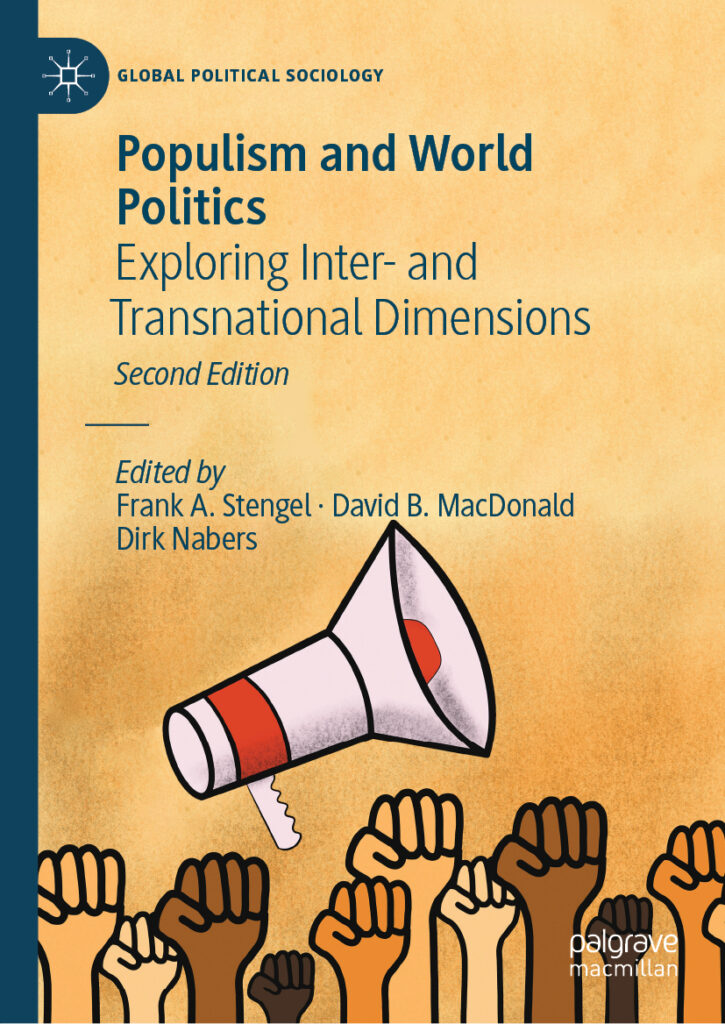
Populism and World Politics: Exploring Inter- and Transnational Dimensions, 2nd ed., Cham: Palgrave Macmillan 2026, co-edited with David B. MacDonald and Dirk Nabers.
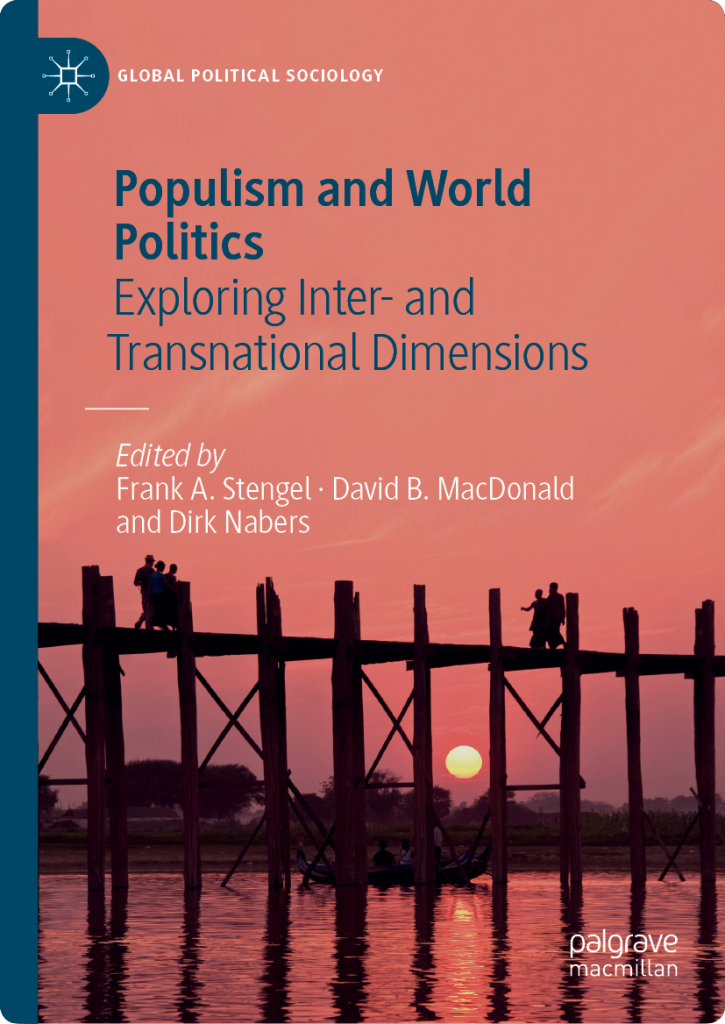
Populism and World Politics: Exploring Inter- and Transnational Dimensions, 1st ed., Basingstoke: Palgrave Macmillan 2019, co-edited with David B. MacDonald and Dirk Nabers.

“Symposium: The Contribution of Laclau’s Discourse Theory to International Relations and International Political Economy,” New Political Science 41:2 (2019), pp. 248-359, with Dirk Nabers.
JOURNAL ARTICLES
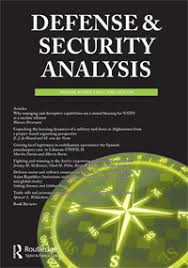
“German ‘Pacifism’ and the Zeitenwende,” Defense & Security Analysis 41:3 (2025), 416-440, doi: 10.1080/14751798.2025.2513782 (pre-print).
Following the Russian invasion of Ukraine on 24 February 2022, German Chancellor Olaf Scholz announced a major reorientation of German security policy, committing the federal government to a significant increase in defence spending as well as arms deliveries to Ukraine. Scholz’s announcement of a Zeitenwende (sea change) has triggered a renewed debate about continuity and change in German security policy, with some observers claiming that the Zeitenwende marks the end of German ‘pacifism’, the country’s traditional culture of military reticence. In this article, I challenge this framing of the issue. I argue that both talking about German military reticence in terms of ‘pacifism’ and conceptualizing it as a rather stable element of culture fail to grasp the messy empirical reality of post-Zeitenwende security policy and leads to false expectations regarding future foreign policy behaviour. I argue in favour of complementing this perspective with a more differentiated discursive approach.
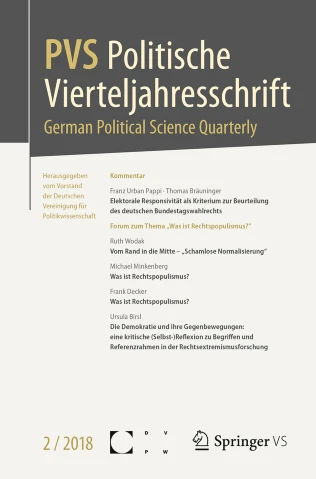
“Crisis and change in post-Zeitenwende German security policy,” Politische Vierteljahresschrift 66:1 (2025), 19-44, doi: 10.1007/s11615-024-00584-5, with Dirk Nabers (open access).
This article examines the nexus between crisis and change in the context of German security policy after the Russian invasion of Ukraine. Chancellor Olaf Scholz’s announcement of a Zeitenwende on 27 February 2022, a few days after the Russian attack, suggests a substantial change in German foreign and security policy. Germany’s security-political reorientation has renewed the debate about change and continuity in German foreign and security policy. Particularly prominent in the discourse is the notion of crisis, which this paper specifically focuses on. We ask first, at a theoretical level, how we can best understand the conceptual nexus between crisis and foreign policy change and second, empirically, how crisis and change are connected in the specific case of the German Zeitenwende. In the attempt to analyze the link between crisis and foreign policy change, we propose that understanding how once-unthinkable policies are made possible requires that we turn our attention to dynamics of discursive change. We illustrate the argument with a mixed-methods analysis of German parliamentary debates between 1987 and 2023.
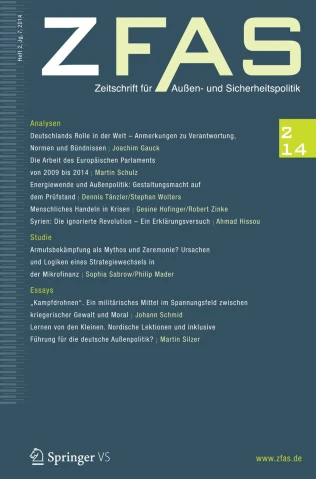
“Think Big(ger)! Why a Feminist Foreign Policy Requires Radical Rethinking,” Zeitschrift für Außen- und Sicherheitspolitik 17:4 (2024), 403-414, online first, doi: 10.1007/s12399-024-01004-7, with Annick T. R. Wibben. (open access)
The publication of the 2023 guidelines by the German Federal Foreign Office did not spark a lasting debate about feminist foreign policy. This is at least in part due to the difficulty to pinpoint what exactly feminist foreign policy should entail. This article develops practical recommendations from a poststructuralist-feminist perspective, complementing the liberal view that informs most policy-oriented work. It suggests that feminist foreign policy requires much more radical rethinking than is often assumed.
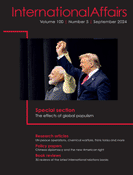
“Left Populism and Foreign Policy: Bernie Sanders and Podemos,” International Affairs 100:5 (2024), pp. 1899-1918, doi: 10.1093/ia/iiae137, with Emmy Eklundh and Thorsten Wojczewski (open access).
This article analyzes how populism is conceptualized and studied in International Relations (IR) and argues that it should be seen as a political logic instead of a political ideology. It does so by demonstrating that ‘populist foreign policy’ looks radically different when analyzing the populist left, refuting the possibility of any distinctly ‘populist’ foreign policy positions. We argue that large parts of IR scholarship practice a form of concept-stretching that undermines the quality of analysis as well as the ability to make meaningful policy recommendations. Using the empirical case studies of Bernie Sanders in the United States and Podemos in Spain, the article demonstrates that populism does not translate into any shared ideological positions but is a way of formulating and performing – in these cases – leftist politics through which political actors can interpellate and mobilize different societal groups and demands behind their political projects. In particular, the analysis debunks common assumptions about populism’s alleged effects on foreign policy and dangers to pluralist democracy and shows that “populism” neither necessarily opposes multilateralism, migration and global public good provision nor formulates an authoritarian claim to power.

“If You’re Not Scared, You Haven’t Been Paying Attention: Trump, the Radicalization of the GOP, and the Future of US Democracy,” Österreichische Zeitschrift für Politikwissenschaft/Austrian Journal of Political Science 52:1 (2023), pp. 32-58, doi: 10.15203/ozp.4066.vol52iss1 (in German) (open access).
The article discusses the future of US democracy after the end of Donald J. Trump’s scandal-ridden presidency, which culminated in a violent attempted self-coup. In contrast to many observers outside the United States who appear to assume that Joe Biden’s inauguration marks the failure of the coup attempt, I argue that this view is overly optimistic. First, Trump by no means acted alone but was supported by leading figures in the Republican Party (GOP). Second, the attack on democratic norms and institutions to restore and permanently cement Republican minority rule continues to move forward. The 2022 midterm elections and the 2024 presidential election et the course on whether the United States will return to liberal democracy or degrade into Hungary-style competitive authoritarianism.
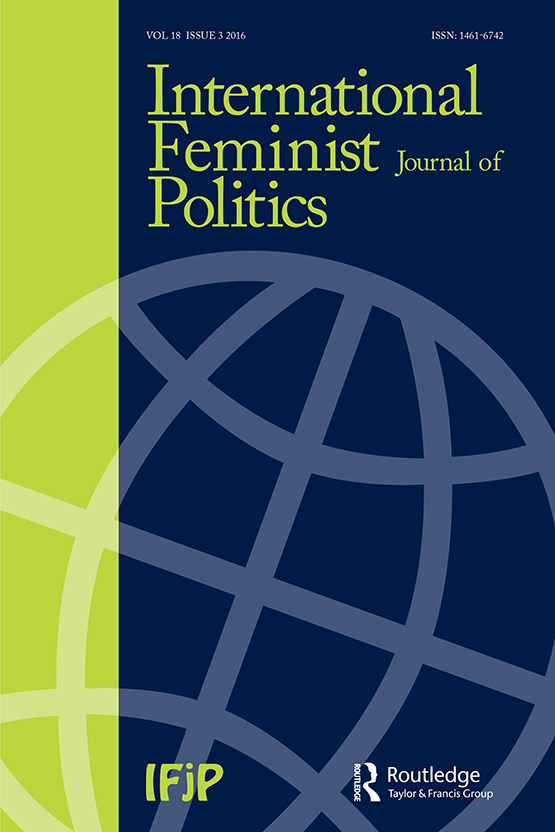
“Militarizing Antimilitarism? Exploring the Gendered Representation of Military Service in German Recruitment Videos on Social Media,” International Feminist Journal of Politics, 24:4 (2022), pp. 608-631, doi: 10.1080/14616742.2021.1935289, with David Shim (Open Access).
This article analyzes the gendered representation of military service in the German YouTube series Die Rekruten (DR), a popular web series produced on behalf of the German armed forces (Bundeswehr) for recruitment purposes, which accompanies 12 navy recruits during their basic training. The article is situated within research on masculinity and the military, in particular military recruitment. It supplements current scholarship by studying a previously neglected case that is of particular interest given Germany’s antimilitarist culture, which should make military recruitment and military public relations more difficult. The article asks how military service is represented in DR, what its discursive effects are, and what role (if any) masculinity plays in this process. We find support for recent feminist research on military masculinities (including in military recruitment) that emphasizes ambiguity and contradiction. What distinguishes the construction of military masculinity in DR from, for example, recruitment advertisements in the United States or the United Kingdom is its markedly civil character. This not only broadens the military’s appeal for a more diverse audience but also increases the legitimacy of the military and its activities. It does so by concealing the violence that has for the past two decades also been a very real part of what the Bundeswehr does.
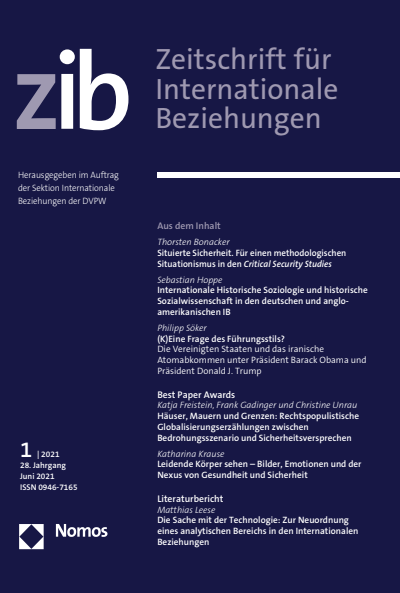
“Soziale Medien und die Legitimitätspolitik der Bundeswehr,” [Military Social Media and the Politics of Legitimacy] Zeitschrift für Internationale Beziehungen, 28:2 (2021), pp. 152-166, doi: 10.5771/0946-7165-2021-2-152 (pre-print).
This article discusses the social media activities of the Bundeswehr, the German Armed Forces, which so far have received only limited attention in the academic literature. The Bundeswehr has an active presence on social media sites, such as Twitter, YouTube, Instagram and Facebook, and it uses it both to inform the public and for recruitment purposes. The article argues that scholars should pay more attention to social media as a significant site where struggles over how to interpret reality play out. To that end, it provides a brief summary of research on social media in Critical Military Studies. Following that, the article provides an overview of the Bundeswehr’s activities on social media and illustrates how the specific way the Bundeswehr presents itself on social media might contribute not just to its legitimacy as a governmental institution but also to the legitimacy of its activities, including military violence.
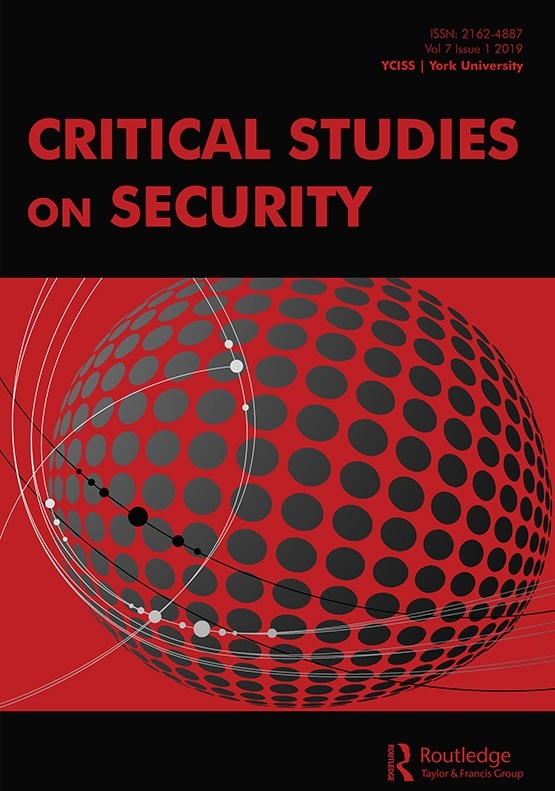
“The Political Production of Ethical War: Rethinking the Ethics/Politics Nexus with Laclau,” Critical Studies on Security, 7:3 (2019), pp. 230-242, doi: 10.1080/21624887.2019.1690861 (prost-print).
Taking Maja Zehfuss’s War & the Politics of Ethics as a starting point, this paper thinks through the ethics/politics nexus from the perspective of ‘Essex School’ poststructuralist discourse theory. Specifically, it asks how ethics – or, rather, morality, the temporary, contingent and context-dependent normative framework that regulates what is commonly seen as good or bad within a given society – is produced. From a discourse theoretical perspective, notions of the moral good are the result of political struggles over meaning. Here Laclau and Mouffe’s conception of hegemony can provide significant insight into how this process works, that is, how some claims about what is morally right become widely accepted as the (only) right thing to do while others fail to do so. The paper illustrates the theoretical argument with a brief case study of the changing articulation of the threat and use of military force in the German security discourse after unification. This case is of particular interest because Germany’s allegedly deeply engrained antimilitarist culture should, from aconventional constructivist perspective at least, stand in the way of any arguments about ethical war ever becoming accepted. Nevertheless, this is precisely what happened.
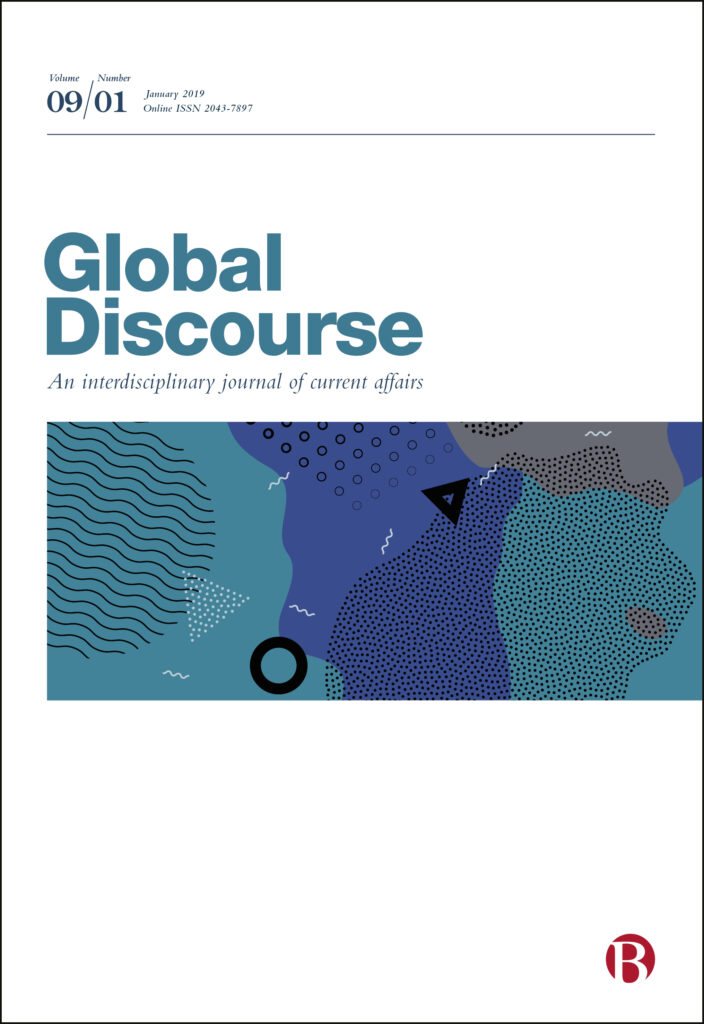
“Forget Populism!” Global Discourse 9:2 (2019), pp. 445-451, doi: 10.1332/204378919X15628418445603 (post-print).
This paper intervenes in the debate about the so-called ‘populist danger’, whose proponents claim that populism constitutes a threat to democracy, European integration, the West, the liberal international order, or all of the above. This paper argues that this argument is severely misguided – with significant consequences for research and political practice. The core problem is that claims of a ‘populist danger’ are based on an exceptionally vague conceptualization of populism that fails to clearly distinguish between left and right, moderate and radical, authoritarian and genuinely democratic versions. In doing so, they not only ignore decades of populism research but also create the impression that actors like Bernie Sanders, Donald J. Trump, Victor Orbán, Marine Le Pen, the Greek Syriza and Spanish PODEMOS (who in fact pursue vastly different and even outright contradictory policy goals) are all variations on a single (populist) theme. Moreover, because advocates of the ‘populist danger’ thesis like Jan-Werner Müller insist that populism as such is inherently anti-pluralist, they hamper efforts to meaningfully distinguish between threats to be countered and legitimate complaints to be taken seriously. This is not just of purely academic interest because any policies based on such an understanding of populism are bound to fail – and potentially backfire. Against this background, the article argues that populism as such is neither inherently anti-democratic nor per se democratic, and using the term to assess the potential dangerousness of certain actors is highly problematic.

“Symposium: The Contribution of Laclau’s Discourse Theory to International Relations and International Political Economy: Introduction,” New Political Science 41:2 (2019), pp. 248-262, doi: 10.1080/07393148.2019.1596683, with Dirk Nabers (open access) (post-print).
This symposium explores the value of Poststructuralist (or Political) Discourse Theory (PDT) for the analysis of world politics. PDT was originally developed by the late Argentine political theorist Ernesto Laclau, in early works together with Chantal Mouffe, and has entered the margins of International Relations (IR) in recent years, mainly by bringing in poststructuralist concepts that had previously been ignored by the more critical strands of theorizing. Against this background, the introduction (1) discusses the disconnect between PDT and research on world politics, primarily in IR, as well as PDT’s potential contribution, (2) provides an overview of PDT’s central theoretical tenets, in particular with respect to its social ontology and its theoretical concept of change, and (3) introduces the contributions to the symposium.
“Securitization as Discursive (Re)Articulation: Explaining the Relative Effectiveness of Threat Construction,” New Political Science 41:2 (2019), pp. 294-312, doi: 10.1080/07393148.2019.1596682 (post-print).
This article develops a poststructuralist framework for the analysis of the process of threat construction or securitization. Taking on-going debates in securitization theory about the securitizing process as a starting point, the article draws on the poststructuralist discourse theory of the Essex School to theorize what makes some securitizing moves (attempts to securitize a certain issue) more effective than others, which remains a persistent and crucial gap in the current literature.
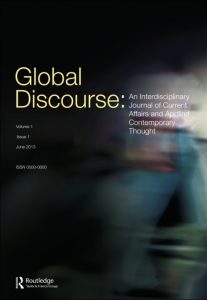
“Social Media, Gender and the Mediatisation of War: Exploring the German Armed Forces’ Visual Representation of the Afghanistan Operation on Facebook”, Global Discourse 7:2-3 (2017), pp. 330-347, doi: 10.1080/23269995.2017.1337982, with David Shim (post-print).
Studies on the mediatisation of war point to attempts of governments to regulate the visual perspective of their involvements in armed conflict – the most notable example being the practice of ‘embedded reporting’ in Iraq and Afghanistan. This paper focuses on a different strategy of visual meaning-making, namely, the publication of images on social media by armed forces themselves. Specifically, we argue that the mediatisation of war literature could profit from an increased engagement with feminist research, both within Critical Security/Critical Military Studies and within Science and Technology Studies that highlight the close connection between masculinity, technology and control. The article examines the German military mission in Afghanistan as represented on the German armed forces’ official Facebook page. Germany constitutes an interesting, and largely neglected, case for the growing literature on the mediatisation of war: its strong antimilitarist political culture makes the representation of war particularly delicate. The paper examines specific representational patterns of Germany’s involvement in Afghanistan and discusses the implications which arise from what is placed inside the frame of visibility and what remains out of its view.
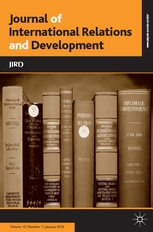
“Foreign Policy Analysis, Globalisation and Non-State Actors: State-Centric After All?” Journal of International Relations and Development 17:4 (2014), pp. 489-521, doi: 10.1057/jird.2013.12, with Rainer Baumann (download).
This paper is concerned with Foreign Policy Analysis (FPA) and non-state actors (NSAs). Globalisation has brought NSAs back on the agenda of International Relations (IR). As a result of globalisation, we witness at least some shift of authority from the state to NSAs (the extent of which remains debated). Although most of the empirical studies focus on ‘domestic’ issues, there are good reasons to assume that foreign policy is equally affected by this trend. Not only are NSAs autonomous actors in world politics, they are also increasingly involved in the making of states’ foreign policies. In this article, we ask to what extent FPA, IR’s actor-centric sub-field, has taken into account this growing importance of NSAs. Given FPA’s criticism of seeing the state as a unitary actor, one would expect FPA scholars to be among the first within IR to analyse decision making involving NSAs. However, a closer look reveals that FPA remains focused mainly on state actors, while ignoring private, transnational and international ones. Thus, FPA remains in a way state-centric. We close with an outline of possible directions for further FPA research.
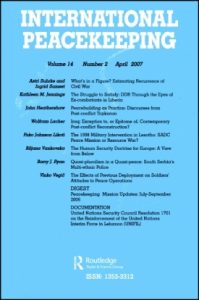
“Action Plan or Faction Plan? Germany’s Eclectic Approach to Conflict Prevention”, International Peacekeeping 17:1 (2010), pp. 93-107, doi: 10.1080/13533311003589264, with Christoph Weller (download).
Conflict prevention, more than other fields of international politics and foreign policy, is characterized by a multiplicity of state and non-state actors, giving rise to particularly complex coordination challenges. This article evaluates the extent to which the German response to these challenges, the action plan for civilian conflict prevention, has succeeded in its aim of improving coordination to increase policy coherence between different governmental agencies as well as with civil society actors. It finds that although the general approach is indeed promising, the government’s lack of commitment prevents it from tapping into the action plan’s full potential.
“Légitimer l’armée en operation: les interventions extérieures de la ‘nouvelle Bundeswehr’ dans la rhetorique du gouvernement rouge-vert“, Allemange d’aujord’hui 192 (2010), pp. 25-34 (download).
“The Reluctant Peacekeeper: Japan’s Ambivalent Stance on UN Peace Operations”, Japan aktuell – Journal of Current Japanese Affairs 16:1 (2008), pp. 37-55 (download).
“Taking Stock: The Focal Points of Abe’s Foreign Policy”, Japan aktuell – Journal of Current Japanese Affairs 15:6 (2007), pp. 53-71 (download).
BOOK CHAPTERS
“Discourse, Fantasy and Anxiety in Trump’s America,” in: John P. Allegrante, Ulrich Hoinkes, Michael Schapira, and Karen Struve (eds.), Anxiety Culture: The New Global State of Human Affairs, Baltimore, MD: Johns Hopkins University Press, 2024, 323-338, with Dirk Nabers (pre-print).
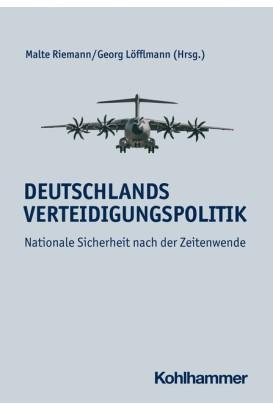
“Bundeswehr und deutsche Gesellschaft: Die Berliner Republik zwischen Militarisierung und Normalisierung”, in: Malte Riemann/Georg Löfflmann (eds.), Deutsche Verteidigungspolitik. Nationale Sicherheit nach der Zeitenwende, Stuttgart: Kohlhammer 2023, pp. 139-153 (pre-print).
“Was zieht junge Menschen in die Bundeswehr? Eine Gender-Analyse der YouTube-Serie ‚Die Rekruten‘”, in: Axel Heck/Gabi Schlag (eds.), Visualität und Weltpolitik. Praktiken des Zeigens und Sehens in den Internationalen Beziehungen, Wiesbaden: Springer VS 2020, pp. 243-274, with David Shim.
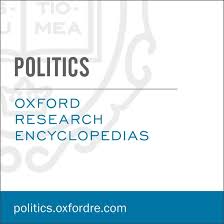
“International/Global Political Sociology”, in: Renée Marlin-Bennett (ed.), The Oxford Research Encyclopedia of International Studies, Oxford: Oxford University Press 2019, with Dirk Nabers, doi: 10.1093/acrefore/9780190846626.013.371 (post-print).
“Introduction: Analyzing the Nexus Between Populism and International Relations”, in: Frank A. Stengel/David B. MacDonald/Dirk Nabers (eds.), Populism and World Politics: Exploring Inter- and Transnational Dimensions, Basingstoke: Palgrave Macmillan 2019, with David B. MacDonald and Dirk Nabers. doi: 10.1007/978-3-030-04621-7_1 (post-print)

“Sedimented Practices and American Identity in Donald J. Trump’s Election Campaign”, in: Frank A. Stengel/David B. MacDonald/Dirk Nabers (eds.), Populism and World Politics: Exploring Inter- and Transnational Dimensions, Basingstoke: Palgrave Macmillan 2019, with Dirk Nabers. doi: 10.1007/978-3-030-04621-7_5 (post-print).
“Conclusion: Populism, Foreign Policy and World Politics”, in: Frank A. Stengel/David B. MacDonald/Dirk Nabers (eds.), Populism and World Politics: Exploring Inter- and Transnational Dimensions, Basingstoke: Palgrave Macmillan 2019, with David B. MacDonald and Dirk Nabers. doi: 10.1007/978-3-030-04621-7 (post-print).
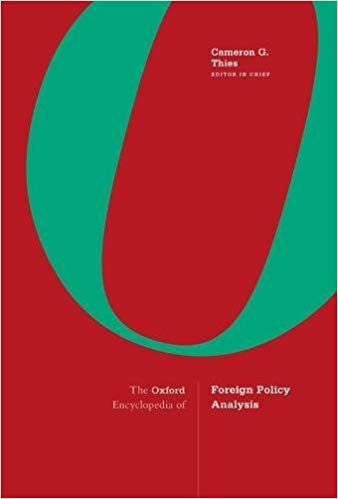
“Non-state Actors and Foreign Policy”, in: Cameron Thies (ed.), The Oxford Encyclopedia of Foreign Policy Analysis, Oxford: Oxford University Press 2018, pp. 266-286, with Rainer Baumann, doi: 10.1093/acrefore/9780190228637.013.456 (post-print).
“Poststrukturalistische Diskurstheorie und Außenpolitk. Wie lässt sich Deutschlands wankelmütige Außenpolitik zwischen Afghanistan und Irak verstehen?”, in: Eva Herschinger/Judith Renner (eds.), Diskursforschung in den internationalen Beziehungen, Baden-Baden: Nomos 2014, pp. 39-74, doi: 10.5771/9783845255873_37, with Martin Nonhoff (download).
“Libanon (Südlibanon)” [Lebanon (South Lebanon)], in: Wolfgang Schreiber (ed.), Das Kriegsgeschehen 2003: Daten und Tendenzen der Kriege und bewaffneten Konflikte, edited by Wolfgang Schreiber, 197-201. Wiesbaden: Verlag für Sozialwissenschaften 2004.
“Libanon (Südlibanon)” [Lebanon (South Lebanon)], in: Wolfgang Schreiber (ed.), Das Kriegsgeschehen 2002: Daten und Tendenzen der Kriege und bewaffneten Konflikte, 220-224. Opladen: Leske + Budrich 2003.
WORKING PAPERS AND POLICY PAPERS
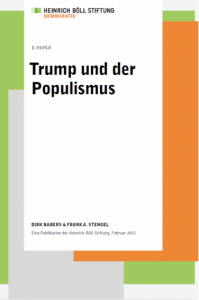
Trump und der Populismus [Trump and Populism]. Berlin: Heinrich Böll Stiftung 2017, with Dirk Nabers (download).
Vier Jahre Aktionsplan “Zivile Krisenprävention” – war das alles? [Four Years of the Action Plan for Civilian Conflict Prevention – Is That All?] GIGA Focus Global 11/2008. Hamburg: GIGA German Institute of Global and Area Studies 2008, with Christoph Weller.
BOOK REVIEWS
Review of Antti Seppo: From Guilt to Responsibility and Beyond: The Evolution of German Strategic Culture after the End of the Cold War, German Politics, doi: 10.1080/09644008.2023.2181588.
Critical Dialogue with Wolfgang Wagner, Perspectives on Politics, 19:3 (2021), pp. 942-946, doi: 10.1017/S1537592721001808.
“Discourse, Fantasy and Affect: Understanding Germany’s Jein on Iraq”, International Studies Review, online first, doi: 10.1093/isr/viaa077 .
Review of Hans J. Gießmann/Armin Wagner (Hrsg.): Armee im Einsatz. Grundlagen, Strategien und Ergebnisse einer Beteiligung der Bundeswehr, Politische Vierteljahresschrift 51:2 (2010), pp. 359-361.
Review of Daniel Nexon/Iver B. Neumann (Hrsg.): Harry Potter and International Relations, Internationale Politik und Gesellschaft 1/2008, pp. 158-161.
Review of Tim Dunne/Milja Kurki/Steve Smith (Hrsg.): International Relations Theories: Discipline and Diversity, Politische Vierteljahresschrift 48:4 (2007), pp. 795-797.
Review of Glenn Palmer/T. Clifton Morgan: A Theory of Foreign Policy, Zeitschrift für Politik 54:3 (2007), 362-364.
Review of Valerie M. Hudson: Foreign Policy Analysis: Classic and Contemporary Theory, Politische Vierteljahresschrift 48:3 (2007), pp. 619-621.
Review of David A. Welch: Painful Choices: A Theory of Foreign Policy Change, Politische Vierteljahresschrift 48:2 (2007), pp. 400-401.
MISCELLANEOUS
“Debating Postcolonialism. Workshop des AK Theorie der AFK, Heinrich-Heine-Universitaet Duesseldorf, 1.-2.2.2019“, Wissenschaft & Frieden 37:3 (2019), pp. 53-55, with Hartwig Hummel and Lotta Mayer.